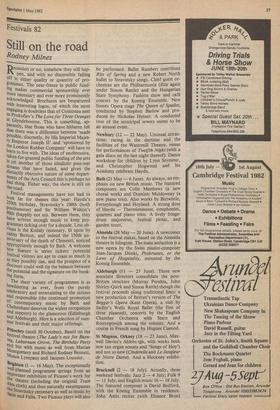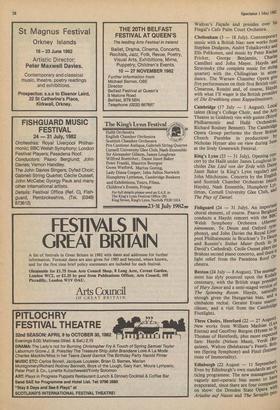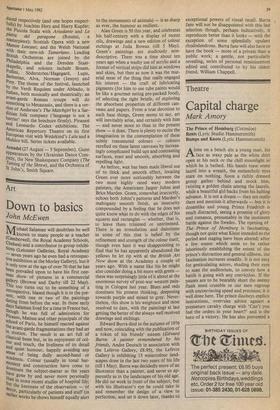Festivals 82
Still on the road
Rodney Milnes
Recession or no, somehow they still hap- pen, and with no discernible falling off in either quality or quantity of pro- grammes. The near-freeze in public fund- ing makes commercial sponsorship ever more necessary and ever more prominently acknowledged. Brochures are bespattered with interesting logos, of which the most engaging is doubtless that of Cointreau next to Prokofiev's The Love for Three Oranges at Glyndebourne. This is something, ap- parently, that those who have hitherto felt that there was a difference between 'made
Possible, discreetly, by His Imperial Majes-
ty Emperor Joseph II' and 'sponsored by the London Rubber Company' will have to learn to live with. The ideas of unobtrusive, taken-for-granted public funding of the arts
is Yet another of those idealistic post-war dreams that have faded, and given the distinctly obtrusive nature of some depart- ments of the Arts Council this is perhaps no bad thing. Either way, the show is still on the'road.
Festival managements have not had to look far for themes this year: Haydn's 250th birthday, Stravinsky's 100th (both Posthumous) and Sir William Walton's 80th (happily not so). Between them, they have written enough music to keep pro- grammes ticking over for a decade. Less ob- vious is the Kodaly centenary, lit upon by
canny Buxton, and indeed the 150th an- niversary of the death of Clementi, noticed
appropriately enough by Bath. A welcome new feature is series tickets: potential festival visitors are apt to cram as much in as they possibly can, and the prospect of a discount could well tip the balance between the potential and the signature on the book- ing form.
The sheer variety of programmes is as bewildering as ever, from the purely celebratory and entertaining to the serious and responsible (the continued promotion of contemporary music by Bath and Cheltenham deserves the widest recognition
and support) to the glamorous (Edinburgh and Aldeburgh). Here is a selection of sum- iner festivals and their major offerings.
Pitlochry (until 30 October). Based on the festival theatre (The Lady's not for Burn- ing, Laburnum Grove, The Birthday Party etc) but with music as well from Marian Montgomery and Richard Rodney Bennett, Moura Lympany and Jacques Loussier.
Brighton (1 — 16 May). The exceptionally Well-planned programme springs from an 1111Portant exhibition of Picasso's work for bleu theatre (including the original Train °Ieu cloth) and thus naturally encompasses the Stravinsky centenary as well as music by Natte and Falla. Two Picasso plays will also
be performed. Ballet Rambert contribute Rite of Spring and a new Robert North ballet to Stravinsky songs. Chief guest or- chestras are the Philharmonia (Rite again under Simon Rattle) and the Hungarian State Symphony. Fashion show and cafe concert by the Koenig Ensemble. New Sussex Opera stage The Queen of Spades, conducted by Stephen Barlow and pro- duced by Nicholas Hytner. A conducted tour of the municipal sewers- seems to be an annual event.
Newbury (12 — 22 May). Unusual attrac- tions: racing in the daytime and the facilities of the Watermill Theatre, venue for performances of Twelfth Night (with a gala disco on the last night thereof). Dance workshop for children by Lynn Seymour, and Christopher Hogwood and his Academy celebrate Haydn.
Bath (21 May — 6 June). As always, an em- phasis on new British music. The featured composers are Colin Matthews (a new choral work) and Dominic Muldowney (a new piano trio). Also works by Birtwistle, Ferneyhough and Hoyland. A strong dose of Haydn — Theresienmesse, symphonies, quartets and piano trios. A lively fringe: drum majorettes, festival picnic, and garden tours.
Almeida (28 May — 20 June). A newcomer to the festival stakes, based on the Almeida theatre in Islington. The main attraction is a new opera by the Swiss pianist-composer Jean-Jacques Diinki, Prokrustes, or the Laws of Hospitality, mounted by the Koenig Ensemble.
Aldeburgh (11 — 27 June). Three new associate directors consolidate the post- Britten structure (Murray Perahia, John Shirley-Quirk and Simon Rattle) though the festival proceeds along traditional lines: a new production of Britten's version of The Beggar's Opera (Kent Opera), a visit by Sadler's Wells Royal Ballet (the first of three planned), concerts by the English Chamber Orchestra with Stern and Rostropovich among the soloists. And a course in French song by Hugues Cuenod.
St Magnus, Orkney (18 — 23 June). Max- well Davies's Aldeburgh, with works both new (an organ sonata and 'Songs of Hoy') and not so new (Cinderella and Le Jongleur de Notre Dame). And a Hockney exhibi- tion.
Bracknell (2 — 18 July). Actually, three weekend festivals: Jazz 2 — 4 July; Folk 9 — 11 July; and English music 16 — 18 July. The featured composer is David Bedford, with the Koenig Ensemble in residence. John Amis recites (with Eleanor Bron)
Walton's Facade and presides over his Fingal's Cafe Palm Court Orchestra.
Cheltenham (3 — 18 July). Contemporary music with a British bias: new works from Stephen Dodgson, Andre Tchaikovsky and Elis Pehkonen, and music by Peter Racine Fricker, George Benjamin, Charles Camilleri and John Mayer. Haydn and Stravinsky (the complete music for string quartet) with the Chilingirian in atten- dance. The Warsaw Chamber Opera give five performances on their first British visit: Cimarosa, Rossini and, of course, Haydn with what I'll wager is the British premiere of Die Erwdhlung eines Kappeilmeisters.
Cambridge (17 July — 1 August). Local talent (King's College Choir, and the Arts Theatre in Goldoni) vies with guests (RbYal Philharmonic and Halle Orchestras, Richard Rodney Bennett). The Cambridge Opera Group performs the three Britten Church Parables in productions by Nicholas Hytner also on view during June at the lively Greenwich Festival.
King's Lynn (23 — 31 July). Opening con- cert by the Halle under James Loughran in- cludes Das Lied von der Erde with Darn! Janet Baker (a King's Lynn regular) ant' John Mitchinson. Concerts by the English and Scottish Chamber Orchestras (nine" Haydn), Nash Ensemble, Humphrey LYt; tleton, Cornell University Glee Club, an The Play of Daniel.
Fishguard (24 — 31 July). An importarldt choral element, of course. Paavo Bergln„nr conducts a Haydn concert with the 13D'' Welsh Symphony Orchestra (Harrno" nienmesse, Te Deum and Oxford sym- phony), and John Davies the Royal Liver pool Philharmonic in Bruckner's Te Deng and Rossini's Stabat Mater (both in David's Cathedral). Cecile Ousset plays the Brahms second piano concerto, and there light relief from the Pasadena Roof or- chestra.
Buxton (24 July — 8 August). The manage- ment has slyly pounced upon the KodalY centenary, with the British stage premiere, of Hary Janos and a semi-staged version 01 The Spinning Room. Haydn, naturallY enough given the Hungarian bias, and 3 cimbalom recital. Geraint Evans master- classes, and a visit from the Cambridge Footlights.
Three Choirs, Hereford (22 — 27 August)' New works from William Mathias (Ltnct Eterna) and Geoffrey Burgon (Hymn to Sd Thomas of Hereford), plus more expecte fare: Haydn (Nelson Mass), Verdi (Re- quiem), Walton (Belshazzar's Feast), Brit- ten (Spring Symphony) and Finzi (Intima- tions of Immortality).
Edinburgh (22 August — 11 September). Even by Edinburgh's own standards an en- ticing programme. The new management ; vaguely anti-operatic bias seems to have evaporated, since there are four comParne,, on show: the Dresden State Opera vilt1' Ariadne auf Naxos and The Seraglio PO' duced respectively (and one hopes respect- fully) by Joachim Herz and Harry Kupfer; the piccola Scala with Ariodante and La Pietra del paragone (Rossini, a masterpiece); Scottish Opera with a new Manors Lescaut; and the Welsh National with their new-ish Tamerlano. Leading British Orchestras are joined by the Philadelphia and the Dresden Staat- skapelle, and soloists include Bream, Pollini, SOderstrOm/Hagegard, Lupu, Berberian, Alva, Norman (Jessye) and by The theme of the festival, launched ny the Verdi Requiem under Abbado, is Italian, both musically and theatrically; an avant-garde Roman troupe will do something to Metastasio, and there is a ver- sion of Andersen's The Matchgirl by a Sar- dinian folk company (`language is not a barrier' says the brochure firmly). Piranesi and Leonardo Codex exhibitions. The American Repertory Theatre on its first European visit with Wedekind's Lulu and a Moliere bill. Series tickets available.
Arundel (27 August — 5 September). Guest appances by the Ukrainian Dance Com- P_anY, the New Shakespeare Company (The Taming of the Shrew), and the Orchestra of St John's, Smith Square.








































 Previous page
Previous page